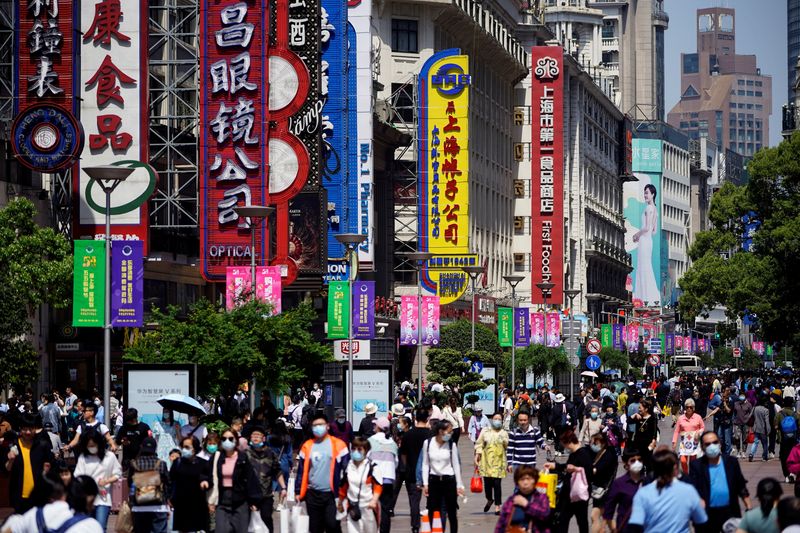China’s factory gate prices fall for first time since Dec 2020 as COVID curbs bite
2022.11.08 21:44
[ad_1]

© Reuters. FILE PHOTO: People walk along Nanjing Pedestrian Road, a main shopping area, in Shanghai, China May 5, 2021. REUTERS/Aly Song
BEIJING (Reuters) -China’s factory gate prices for October dropped for the first time since December 2020, and consumer inflation moderated, underlining faltering domestic demand and disruptions to production amid strict COVID curbs and a weak property sector.
The producer price index (PPI) fell 1.3% year-on-year, reversing from a 0.9% gain a month earlier, National Bureau of Statistics (NBS) data showed on Wednesday, and compared with a forecast of a 1.5% contraction in a Reuters poll.
The deflationary impulse in the producer price gauge partly reflected the sharply higher year-ago levels and falling commodity prices, according to an accompanying NBS statement.
Prices in coal mining and washing industry were down 16.5%, deepening from a 2.7% drop in the previous month, while those in ferrous metal smelting and rolling processing slumped 21.1% after decline 18.0% in September.
The consumer price index (CPI) climbed 2.1% from a year earlier, easing from a 29-month high of a 2.8% increase in September, mainly driven by falling food prices. It was also slower than the 2.4% forecast by analysts.
The world’s second-largest economy has been hobbled this year by a recurrence of COVID-19 outbreaks, forcing authorities to implement strict anti-virus curbs in a blow to factory and consumer activity.
China’s trade engine has also taken a hit, with exports and imports shrinking in October, and economists are warning of further weakness over the coming quarters due to pressure at home and global recession risks.
Almost three years into the pandemic, China has pledged to press on with its strict COVID-19 containment strategy. Analysts say policymakers will be cautious in easing monetary policy for fear of capital flight amid sweeping global interest rate hikes, led by the Federal Reserve.
currency has already been pummelled this year by the global tightening trend and a buoyant U.S. dollar.
The International Monetary Fund last month said it expects China’s growth to slow to 3.2% this year, a 1.2-point downgrade from its April projection, on expectations of a gradual lift of strict COVID-19 curbs next year but no quick resolution to the real estate crisis.
[ad_2]
Source link








